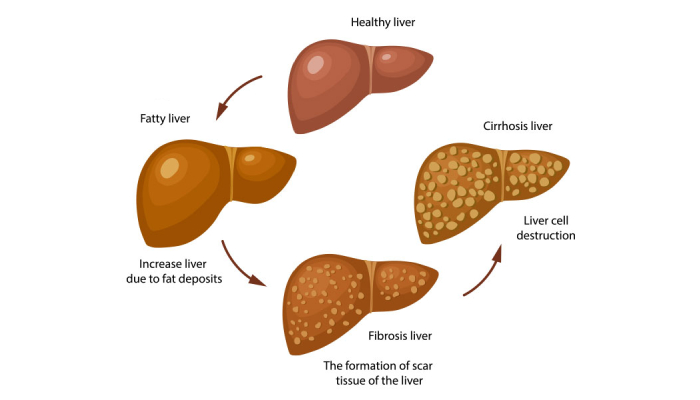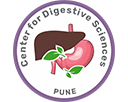What Is Cirrhosis Of The Liver?
Cirrhosis is a late-stage liver disease in which healthy liver tissue is replaced with scar tissue and the liver is permanently damaged. Scar tissue keeps your liver from working properly. Many types of liver diseases and conditions injure healthy liver cells, causing cell death and inflammation. This is followed by cell repair and finally tissue scarring as a result of the repair process.
The scar tissue blocks the flow of blood through the liver and slows the liver’s ability to process nutrients, hormones, drugs and natural toxins (poisons). It also reduces the production of proteins and other substances made by the liver. Cirrhosis eventually keeps the liver from working properly. Late-stage cirrhosis is life-threatening.

Is Cirrhosis Cancer?
No, cirrhosis of the liver isn’t cancer. However, most people who have liver cancer have cirrhosis. If you have cirrhosis, you have an increased risk of liver cancer. If you have hepatitis B or hepatitis C, you have an increased risk of liver cancer because these diseases often lead to cirrhosis. Any cause of liver disease can lead to cirrhosis, which increases your chance of liver cancer.
What Causes Cirrhosis?
The most common causes of cirrhosis of the liver are:
- Alcohol abuse (alcohol-related liver disease caused by long-term [chronic] use of alcohol).
- Chronic viral infections of the liver
- Fatty liver associated with obesity and diabetes and not alcohol. This condition is called non-alcoholic steatohepatitis.
- Wilson disease (excess copper stored in the liver).
- Cystic fibrosis (sticky, thick mucus builds up in the liver).
Risk Factors
Factors that increase the risk of stomach cancer include:
- Gastroesophageal reflux disease
- Obesity
- A diet high in salty and smoked foods
- A diet low in fruits and vegetables
- Family history of stomach cancer
- Infection with Helicobacter pylori
- Long-term stomach inflammation (gastritis)
- Smoking
- Stomach polyps
What Are The Symptoms of Cirrhosis?
- Loss of appetite.
- Feeling weak or tired.
- Nausea.
- Fever.
- Unexpected weight loss.
- Easy bruising and bleeding.
- Itchy skin.
How Is Cirrhosis Of The Liver Treated?
Treatment depends on what’s causing your cirrhosis and how much damage exists.
- Alcohol-related liver disease: If you’ve developed cirrhosis from alcohol abuse, stop drinking alcohol. If you need help, ask your healthcare provider for recommendations for alcohol addiction treatment programs.
- Hepatitis B or C: Several approved antiviral medications are available to treat hepatitis types B and C.
- Nonalcoholic fatty liver disease: Management of nonalcoholic fatty liver disease includes losing weight, following a healthy diet, getting physical exercise and following your provider’s instructions for managing your diabetes.
- Autoimmune hepatitis: Treatment includes medications to suppress your immune system.
- Diseases that damage or block bile ducts in the liver: Treatments include medications such as ursodiol or surgery to open narrowed or blocked bile ducts.
- Medications that may be contributing to cirrhosis: Your provider will review all of your medications to determine if any are causing problems for your liver and if so, stop the drug, lower the dosage or change to a different drug if possible.
How Is Cirrhosis Of The Liver Diagnosed?
Your healthcare provider will first ask about your medical history and over-the-counter and prescription drug use. They will also ask about any supplements or herbal products you may take. Your provider may suspect you have cirrhosis if you have a long history of alcohol abuse, injectable drug abuse or have had hepatitis B or C and have the symptoms listed in this article. To diagnosis cirrhosis, your provider will perform a physical exam and may order one or more of the following tests:
- Physical exam: Your doctor will examine you, looking for the signs and symptoms of cirrhosis including: the red, spider-like blood vessels on your skin; yellowing of your skin or whites of your eyes; bruises on your skin; redness on your palms; swelling, tenderness or pain in your abdomen; enlarged firmer-feeling, bumpy texture to the lower edge of your liver
- Blood tests: If your doctor suspects cirrhosis, your blood will be checked for signs of liver disease.
- Imaging tests: Imaging test show the size, shape and texture of the liver. These tests can also determine the amount of scarring, the amount of fat you have in your liver and fluid in your abdomen. Imaging tests of your liver that could be ordered include computerized tomography (CT) scan, abdominal ultrasound and magnetic resonance imaging (MRI). A special ultrasound, called a transient elastography, measures the fat content and amount of stiffness in your liver. Two different types of endoscopies might be ordered: an endoscopic retrograde cholangiopancreatography to detect bile duct problems, and/or upper endoscopy to detect enlarged veins (varices) or bleeding in your esophagus, stomach or intestines.
- Biopsy: A sample of liver tissue (biopsy) is removed from your liver and examined under the microscope. A liver biopsy can confirm a diagnosis of cirrhosis, determine other causes or extent of liver damage or enlargement or diagnosis liver cancer.
Book Your Appointment Today
Book your appointment with Dr. Ujwal Zambare he is having 12 years of experience in Gastro-intestinal surgery, oncology, minimally invasive surgery and Liver, Pancreas, Biliary tract surgery.

Dr. Ujwal Zambare
MBBS, MS (General Surgery), DNB (Gastrointestinal Surgery)
Fellowship in Minimal Access Surgery
Copyright © 2021. Dr. Ujwal Zambare – Liver, Pancreas, Biliary Tract Surgery Specialist in Pune. | All Rights Reserved.
All Text and Images is for information of Patients and Public and doesn’t replace medical practitioners advice. Visit doctor for medical advice.



